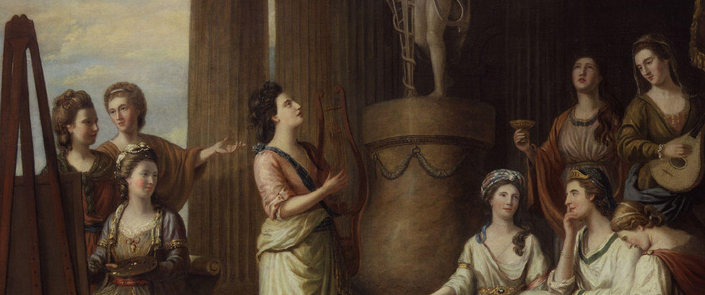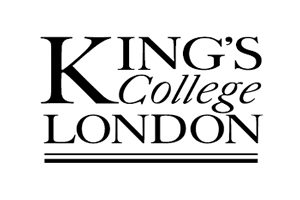The Blue Stockings
Go to: Biography | The Portrait | The Bookshelf | Bluestocking Circle | Resources

[The Nine Muses]
Elizabeth Montagu is remembered today as the leading hostess of what became known as the Bluestocking circle. The practice of women holding gatherings in their own houses to which men and women were invited to discuss literary topics was well-established in contemporary France, where such salonnières as the Marquise de Lambert, and later the Marquise du Deffand and Madame Geoffrin, played a leading role in Parisian society.
The first generation of the Bluestocking Circle began when Elizabeth Montagu opened correspondences with other elite ladies who established similar assemblies in London in the 1750s. Chief among these were Frances Boscawen (1719-1805) and Elizabeth Vesey (1715-1791). Frances Boscawen was the wife of Admiral Edward Boscawen (1711-1761) and her house at 14 South Audley Street, Mayfair, became a hub to rival Montagu’s own Hill Street home. Elizabeth Vesey, like Montagu’s other contacts Anne Donnellan and Mary Delany, came from the Anglo-Irish elite, and divided her time between the Irish estate of Lucan, near Dublin, and her London home at Clarges Street, Mayfair. Nicknamed 'the Sylph' as a result of her vague and impractical attitude, Vesey was one of Montagu’s most consistent correspondents, and wrote gnomic, stream-of-consciousness letters in a crab-like and scrawling hand. Mrs Montagu developed close friendships with other women, particularly Elizabeth Carter, who became famous as a classicist and published the first English translation of the works of Epictetus. Mrs Montagu learned of Carter’s reputation and, having sought her out in 1758, became her devoted friend. Other members of this circle included Sarah Fielding, Hester Chapone, who acted as beneficiaries of Montagu’s patronage, as well as Samuel Johnson, Frances and Joshua Reynolds, Eva Maria and David Garrick, and Edmund Burke. It was Dr Samuel Johnson who christened Mrs Montagu 'Queen of the Blues'. He was a regular guest at her house and admired her intellect, saying ‘she diffuses more knowledge in her conversation than any woman I know, or, indeed, almost any man’.
The origin of the term Bluestocking is obscure, but it seems that Benjamin Stillingfleet, grandson of a bishop, was teased for coming to one of the meetings wearing his workaday worsted stockings rather than elegant silk hose, and the cry ‘come in your blue stockings’ became a regular refrain, indicating that the gatherings should be informal, intimate affairs rather than grand assemblies. It is ironic that the term bluestocking was later used to refer to intellectual women, and moreover in a pejorative way. Montagu herself was happy to accept the label, and referred in her letters to 'bluestocking philosophy'. This was not a system so much as a set of shared practices: the Bluestocking salons did not allow alcohol or gaming, men and women mixed on terms of mutual respect and overt flirtation or malicious gossip was frowned upon, and respect was to be shown to the monarchy and the church. The intention was to distinguish their meetings from the riotous assemblies of the aristocracy, at which heiresses were seduced and fortunes lost at the card-table. Montagu and her friends wished to establish in the public mind the idea that women could be visible in society and engage in intellectual pursuits and yet remain socially respectable. Hannah More, who celebrated the Bluestockings in her poem 'The Bas Bleu' (1784), said that in their circle ‘learning was as little disfigured by pedantry, good taste as little tinctured by affectation, and general conversation as little disgraced by calumny, levity, and the other censurable errors with which it is too commonly tainted, as has perhaps been known in any society’.
By the 1770s and 80s, a second generation of Bluestockings had begun to arise, which lacked the conservative, elite, tenor of the first wave. Whilst the original hostesses continued to hold sway, they were joined by the more unconventional Hester Thrale Piozzi (1740-1821) whose Welshness, marriage to a brewer, salon located in Streatham, and rejection of formal seating patterns marked her community of 'Streatham Worthies' as something distinct. This second generation was also marked by an expansion of the scope and background of the new Bluestocking writers themselves. The novelist Frances Burney (1752-1840) joined the community fresh from the success of her 1778 novel Evelina, and Anna Laetitia Barbauld (1743-1825), the Dissenter, children’s writer, and future author of the apocalyptic anti-imperial poem 'Eighteen-Hundred and Eleven' (1812), joined the hitherto conservative community. Hannah More (1745-1833), with her evangelical religion and radical abolitionist politics also joined the community, for which she became the spokeswoman with the above-mentioned 'The Bas Bleu' in 1786.
For many years, Montagu’s salons were held at her house in Hill Street, London, but after her husband’s death in 1775, she built herself a large house in Portman Square. It was not until 1799, when she was eight-one years old, that she finally stopped hosting her assemblies.
Please note that all dates and location information are provisional, initially taken from the library and archive catalogues. As our section editors continue to work through the material we will update our database and the changes will be reflected across the edition.
Browser support: The website works best using the Chrome, Edge, and Firefox browsers on the PC, and only Chrome and Firefox on the Mac.




